Nicola Ranger

Professor Nicola Ranger is Executive Director of Earth Capital Nexus and Professor in Practice of Natural Capital, Risk and Finance in the Grantham Research Institute on Climate Change and the Environment at the London School of Economics and Political Science. She leads interdisciplinary research and policy engagement at the nexus of finance, investment, natural capital, resilience and sustainable development with a global focus.
Professor Ranger is a globally recognized expert in sustainable finance, climate and nature, and systemic resilience. Her research focuses on integrating climate and nature risks into financial decision-making, developing innovative financial instruments, green fiscal policy, debt sustainability and mobilizing investment for sustainable development. She works closely with financial institutions, central banks, governments, and international organizations.
Professor Ranger has published extensively on topics related to sustainable finance, risk, resilience, nature and development. She serves on several high-level advisory groups, including those for the World Bank, the Bank of England’s Climate Financial Risk Forum, the Network for Greening the Financial System, TRASE, Natural State and PlanetaryX.
She also holds the following positions:
- Theme lead for the Protecting and Enhancing Nature and Biodiversity theme at the Global School of Sustainability at LSE
- Founding Director, Resilient Planet Finance Lab
- Co-Director, UKRI Integrating Finance and Biodiversity
- Co-Director, Leveraging Earth Observation for Nature Finance
- Senior Research Fellow, Institute for New Economic Thinking, Oxford Martin School
- Senior Associate, Oxford Net Zero
- Fellow, Centre for Economic Policy Research
Background
Nicola brings two decades of experience working in senior roles across government, research, international financial institutions and the private sector. Most recently, this includes leadership roles at the Environmental Change Institute of the University of Oxford, the World Bank and DFID (now FCDO) where she works with financial institutions, Ministries of Finance, Central Banks, International Financial Institutions to strengthen fiscal and financial resilience to climate and other crises, mobilise finance for sustainable development, and put in place systems to strengthen resilience to shocks and crises.
During her career, Nicola has been involved in founding and leading many significant global initiatives related to sustainable finance and systemic resilience, including the G20-V20 InsuResilience Global Partnership, the Global Shield Financing Facility, the Centre for Greening Finance and Investment and the Centre for Disaster Protection. She led the first nature-related stress test for a G7 economy (the UK) and has been involved in leading work on climate financial and fiscal risks and risk management across more than 10 countries. She also works extensively on mobilising sustainable investment. She was a member of the European Commission High Level Expert Group on Sustainable Finance in Low and Middle Income Economies; the UK Green Taxonomy Advisory Group; and the Financial Systems Thinking Innovation Centre of the Institute and Faculty of Actuaries, as well as a Visiting Researcher at the Bank of England and Senior Advisor to the World Bank. Nicola also has a professional background in risk financing and has been involved in establishing insurance-based mechanisms, contingent financing and regional risk pools across multiple countries
Prior to this, Nicola was a Senior Research Fellow and Head of Adaptation and Development at the Grantham Research Institute, LSE between 2009 and 2013. In 2005/06, she was part of the HMT/Cabinet Office Stern Review on the Economics of Climate Change and has worked as a Scientific Advisor at Defra, HM Treasury and the Parliamentary Office of Science and Technology. Nicola completed her postdoctoral research in climate economics and policy at the Grantham Research Institute LSE and holds a doctorate in Atmospheric Physics from Imperial College London.
Research interests
- Sustainable finance
- Fiscal and financial policy and regulation
- Risk analytics, modelling, stress testing and scenario analysis
- The economics of natural capital
- Risk and decision making
- Disaster risk financing and insurance
- International financial system
- Sustainable development
- Mobilising sustainable investment in emerging and developing economies
- Nature finance and investment
- Adaptation and resilience finance
- Systemic resilience
- Development and humanitarian finance
Research
Research - 2026
The authors of this commentary article argue that to understand the urgency of emissions reductions, policymakers and citizens need a full analysis of what is at stake. Read more

This paper empirically evaluates the extent of adaptation and resilience (A&R) -related information in current corporate sustainability reports to provide such insights. Read more

Research - 2025
By understanding the barriers and opportunities to engage the private sector, this research explores how cities can create an enabling environment to mobilize private finance for resilience. Read more

tilizing insights from complexity theory and systems thinking, this paper proposes a holistic framework of seven criteria to evaluate modeling approaches and policies for systemic resilience. Read more

This paper builds on established sustainability disclosure frameworks to develop a common adaptation and resilience disclosure framework to enhance companies’ A&R reporting while making public information more comparable and usable for investors and regulators. Read more

This paper explores how sustainability-linked finance (SLF) can serve as an effective mechanism to realign financial incentives and unlock firm-level innovation in climate resilience. Read more
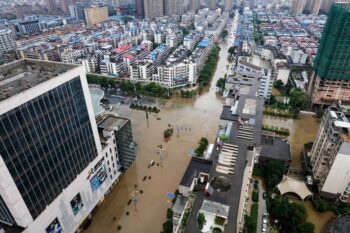
This study provides the first comprehensive analysis of Southeast Asia’s sustainability-linked finance market, addressing critical gaps in integrating nature-related risks into financial instruments. Read more

Climate adaptation finance is intended to fund activities to reduce the physical climate risks faced by countries. The quantity of... Read more

In this paper, the authors introduce an open, modular, and reproducible framework for the assessment of asset-level physical risk and the translation of these risks into portfolio-level impacts. Read more

Research - 2013
Official development assistance (ODA) currently totals around $130 billion USD per year, an order of magnitude greater than international climate... Read more

Nicola Ranger, Alex Harvey and Su-Lin Garbett-Shiels. Forthcoming. Read more

Abstract Over the past decade, the increase in insurance demand in the BRICS has been a key driver of global... Read more

Research - 2012
Reference Ranger, N., and Fisher, S. November 2012. The challenges of climate change and exposure growth for disaster risk management in... Read more

Reference Ranger, N., et al. November 2012. Reducing risks of future disasters: priorities for decision makers. Final Project Report. The Government Office... Read more

Abstract Current projections of long-term trends in Atlantic hurricane activity due to climate change are deeply uncertain, both in magnitude... Read more

Research - 2011
Working Paper 63 Abstract Over the past decade, growth in insurance demand in the BRICS economies has been a key... Read more

Working Paper 62 Abstract Multi-year insurance has been proposed as a tool to incentivise policyholders to invest in property level... Read more

Working Paper 61 Abstract Insurance demand is driven by many factors, but for the emerging economies, one of the most... Read more

Working Paper 51 Abstract Current projections of long-term trends in Atlantic hurricane activity due to climate change are deeply uncertain,... Read more

Working Paper 50 Abstract The series of devastating natural disasters around the world during the past few years has raised... Read more

Abstract This paper presents a first estimate of the exposure of the world’s large port cities (population exceeding one million... Read more

Abstract This paper presents a first estimate of the exposure of the world’s large port cities (population exceeding one million... Read more

Abstract Managing risks from extreme events will be a crucial component of climate change adaptation. In this study, we demonstrate... Read more

Policy
Policy - 2025
This report assesses how nature is included within the World Bank’s Country Climate and Development Reports (CCDRs). Read more

This CETEx discussion paper highlights the significant potential for scaling up sustainability-linked finance, but also reveals a persistent gap between corporate disclosures, loan covenants and global standards. Read more
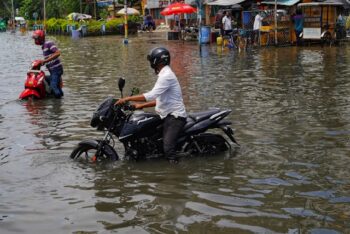
A response to the open consultation by the Bank of England CP10/25 — Enhancing banks’ and insurers’ approaches to managing climate-related risks — Update to SS3/19. Read more

This report investigates the rationale, feasibility, and implications of integrating nature-related risks into the Low-Income Country Debt Sustainability Framework (LIC-DSF). Read more

Policy - 2023
This publication forms the chair’s report for the Independent Expert Advisory Group convened by the Climate Change Committee to support... Read more

Policy - 2013
Headline issue In 2015, the Millennium Development Goals (MDGs) expire. Detailed discussions are already underway to inform the post-2015 development... Read more

Headline issue The economic costs of natural disasters have continued to rise since the early 1980s and are expected to... Read more

This report examines CO2 budgets and the growing ‘carbon bubble’, as well as its effects on the economy and global... Read more

An Independent National Adaptation Programme for England Read more

Policy - 2011
Extreme weather events represent the earliest, and in some places most significant, threats to the most vulnerable countries that are... Read more

Climate change is increasingly altering the pattern of climate-related risks. Developing countries, and in particular least developed countries, will be... Read more

Policy - 2010
Headline issue Climate change is one of the most significant challenges we face. It will impact the UK population, environment... Read more

Executive summary The Parties to the United Nations Framework Convention on Climate Change (UNFCCC) are contemplating a range of goals... Read more

Policy - 2009
Mitigating climate change through reductions in greenhouse gas emissions: the science and economics of future paths for global annual emissions Read more

Events
Events - 2025
Events - 2021
News
News - 2026
As a major new global assessment of business and biodiversity reveals serious nature-related macroeconomic risks, this commentary examines the issues and calls for economic practice to align with ecological reality. Read more

News - 2025
Valor International, 11 November 2025 Read more
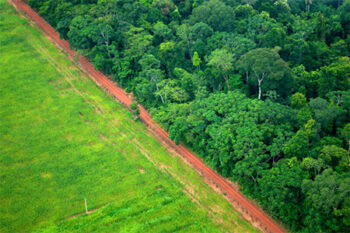
This commentary explains why tropical forests should be designated as ‘Global Systemically Important Natural Systems (G-SINS)’ – essential to global economic security and financial stability – and ask if and how the proposed Tropical Forest Forever Facility (TFFF) could anchor a new global architecture for financing nature and resilience. Read more
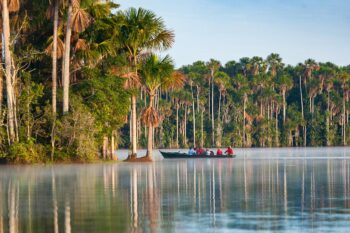
By ignoring natural capital, a huge investment opportunity is being missed and societies globally put at risk, writes Nicola Ranger. Read more

In this commentary article Nicola Ranger explains why it is important for companies to take into consideration nature related issues – such as pollution, water scarcity and biodiversity loss. Read more

The authors of this commentary set out four essential priorities that will help build the UK’s financial resilience in the face of real-world climate risks. Read more

As international financial institutions review the IMF-World Bank Debt Sustainability Framework, integrating nature must be a core priority, this commentary asserts. Read more
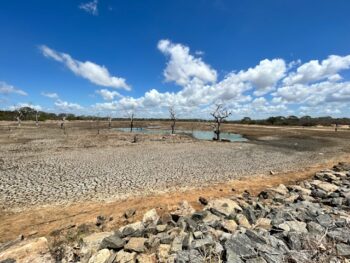
News - 2013
Senior Research Fellow, Nicola Ranger, produced this topic guide to stimulate thinking about two major issues: first, how climate change may alter the long-term outcomes of development interventions today, and, second, how such interventions can be better designed from the outset to have outcomes that enhance climate resilience and are themselves robust and adaptable to long-term stresses, like climate change. Read more
News - 2012
Dr Nicola Ranger argues that to tackle the unique challenges of climate change and growth, we also need to change the way... Read more

News - 2011
The first set of reports from public bodies setting out what they are doing to adapt to the impacts of... Read more

News - 2010
The Conservative party conference in Birmingham may be the focus of UK politics this week, but government representatives will be... Read more


